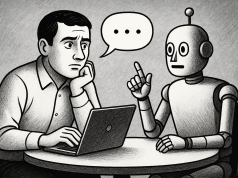In an age where artificial intelligence (AI) is revolutionizing the way brands engage with their audiences, a critical conversation emerges around the intersection of technology, branding, and the human workforce. As we plunge deeper into a reality dominated by algorithms and data-driven decisions, it’s imperative to reflect on how these advancements impact not just the efficiency and reach of a brand’s messaging, but also the authenticity and human connection that form the bedrock of trust between a company and its community.
The advent of AI-driven branding brings with it a host of opportunities and challenges. On one hand, technology enables brands to personalize experiences, predict consumer behavior, and streamline marketing operations. On the other hand, there’s a palpable concern that the pervasiveness of AI could lead to a depersonalized landscape where employee voices and values are overshadowed by cold, algorithmic directives.
As an Employee Rights Activist, I stress the importance of maintaining a human-centric approach to branding, even as AI takes on a greater role in shaping brand narratives. Workers, after all, are not just cogs in a machine; they are ambassadors of the brand and should be recognized as such. Their insights, experiences, and values contribute to a brand’s story, and this story should resonate with authenticity and relatability. It’s the unique human touch that can turn a customer into a loyal advocate.
But how do we ensure that as branding becomes more AI-driven, it doesn’t lose its soul? It starts with workers advocating for their rightful place in the branding ecosystem. They must be encouraged to share their stories and contribute to the brand’s narrative. In turn, employers have a responsibility to listen, amplify, and integrate these perspectives into their branding strategies. This symbiotic relationship can create a rich, authentic brand identity that respects both technological progress and employee integrity.
A shining example of this balance is found in companies that leverage AI to enhance customer service but empower their employees to take the lead on empathy and problem-solving. These organizations use AI to inform and support their workforce, not to replace the nuanced human interactions that foster deep connections with the audience.
At The Work Times, we understand the value of the human element in all aspects of work, including branding. Our readers, who share the same demographic as The New York Times audience, are savvy individuals keen on navigating the evolving workplace and ensuring that their roles and rights are not diminished in the face of technological advancement.
In conclusion, as we continue to embrace AI in branding, let us not forget that the heart of a brand’s success lies in its authenticity and the stories of the people behind it. By championing a brand narrative that harmonizes technological efficiency with the irreplaceable human element, we not only uphold the rights and dignity of workers but also build a brand that is truly resonant and enduring. It’s a call to action for all workers and employers to co-create a future where technology serves humanity, not the other way around.




























